
Dogfan, also known as Doewan, was a saint and martyr who lived in 5th century Wales. [1] He is venerated in the Anglican Church , Eastern Orthodox Church, True Orthodox Church, and Roman Catholic Church, on 13 July.

Dogfan, also known as Doewan, was a saint and martyr who lived in 5th century Wales. [1] He is venerated in the Anglican Church , Eastern Orthodox Church, True Orthodox Church, and Roman Catholic Church, on 13 July.
He is the patron saint of Llanrhaeadr-ym-Mochnant in Wales. The town may have been the birthplace of his mother. [2] He was also one of the sons of king Brychan. [3]
He is said to have been put to death by Anglo-Saxon heathen invaders in Pembrokeshire, where a church was built to his memory. [4]
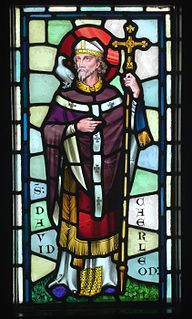
Saint David was a Welsh bishop of Mynyw during the 6th century. He is the patron saint of Wales. David was a native of Wales, and tradition has preserved a relatively large amount of detail about his life. His birth date, however, is uncertain: suggestions range from 462 to 512. He is traditionally believed to be the son of Saint Non and the grandson of Ceredig ap Cunedda, king of Ceredigion. The Welsh annals placed his death 569 years after the birth of Christ, but Phillimore's dating revised this to 601.
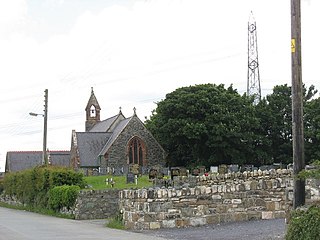
Saint Elen, often anglicized as Helen, was a late 4th-century founder of churches in Wales. Traditionally, she is said to have been a daughter of the Romano-British ruler Octavius / Eudaf Hen and the wife of Magnus Maximus / Macsen Wledig, the 4th-century emperor in Britain, Gaul, and Spain who was killed in battle in 388. Although never formally canonized by Rome, Elen is traditionally considered a saint in the Welsh Church; in English she is sometimes known as Saint Helen of Caernarfon to distinguish her from Saint Helena.
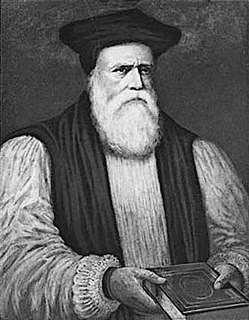
William Morgan was a Welsh Bishop of Llandaff and of St Asaph, and the translator of the first version of the whole Bible into Welsh from Greek and Hebrew.
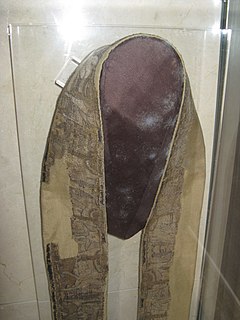
Paul Aurelian was a 6th-century Welshman who became first bishop of the See of Léon and one of the seven founder saints of Brittany. He allegedly died in 575, rumoured to have lived to the age of 140, after having been assisted in his labors by three successive coadjutors. This suggests that several Pauls have been conflated. Gilbert Hunter Doble thought that he might have been Saint Paulinus of Wales.

Saint Deiniol was traditionally the first Bishop of Bangor in the Kingdom of Gwynedd, Wales. The present Bangor Cathedral, dedicated to Deiniol, is said to be on the site where his monastery stood. He is venerated in Brittany as Saint Denoual. In English and Latin his name is sometimes rendered as Daniel.
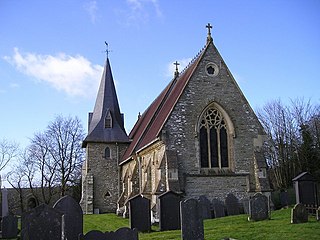
Saint Cynllo is a British saint, who lived in the late 5th and early 6th centuries, generally described as a brother of Saint Teilo. Cynllo was known for "...the sanctity of his life and the austerity of his manners."

Saint Alban is venerated as the first-recorded British Christian martyr, for which reason he is considered to be the British protomartyr. Along with fellow Saints Julius and Aaron, Alban is one of three named martyrs recorded at an early date from Roman Britain. He is traditionally believed to have been beheaded in Verulamium sometime during the 3rd or 4th century, and his cult has been celebrated there since ancient times.

Saint Peris was a little-known Welsh saint of the early Christian period, possibly 6th century.

Erbistock is a village and community in Wrexham County Borough, Wales. The village lies on the banks of the River Dee.

Saint Cybi or Saint Cuby was a 6th-century Cornish bishop, saint and, briefly, king, who worked largely in North Wales: his biography is recorded in two slightly variant medieval 'lives'.

Dubricius or Dubric was a 6th-century British ecclesiastic venerated as a saint. He was the evangelist of Ergyng and much of south-east Wales.

Saint Afan of Builth was an early 6th-century Welsh bishop, martyr, and saint. His feast day is generally placed on 17 November, although the Demetian Calendar formerly used in southern Wales placed it on the 16th; it is no longer observed by either the Anglican or Catholic church in Wales.
Christianity is the majority religion in Wales. From 1534 until 1920 the established church was the Church of England, but this was disestablished in Wales in 1920, becoming the still Anglican but self-governing Church in Wales. Wales also has a strong tradition of nonconformism and Methodism.

The Personal Ordinariate of Our Lady of Walsingham in England and Wales is a personal ordinariate in the Latin Church of the Catholic Church immediately exempt to the Holy See within the territory of the Catholic Bishops' Conference of England and Wales, of which its ordinary is a member, and encompassing Scotland also. It was established on 15 January 2011 for groups of former Anglicans in England and Wales in accordance with the apostolic constitution Anglicanorum coetibus of Pope Benedict XVI.

Saint Teilo, also known by his Cornish name Eliud, was a British Christian monk, bishop, and founder of monasteries and churches. He was from Penalun (Penally) near Tenby in Pembrokeshire, south Wales.

Saint Peter, also known as Peter the Apostle, Peter the Rock, Simon Peter, Simeon, Simon or Cephas, was one of the Twelve Apostles of Jesus Christ, and one of the first leaders of the early Church. He is traditionally counted as the first bishop of Rome—or pope—and also as the first bishop of Antioch. Based on contemporary historical data, his papacy is estimated to have spanned from AD 30 to his death, which would make him the longest-reigning pope, at anywhere from 34 to 38 years; however, the length of his reign has never been verified.

Deruvian, also known by several other names including Damian, was a possibly legendary 2nd-century bishop and saint, said to have been sent by the pope to answer King Lucius's request for baptism and conversion to Christianity. Together with his companion St Fagan, he was sometimes reckoned as the apostle of Britain. King Lucius's letter may represent earlier traditions but does not appear in surviving sources before the 6th century; the names of the bishops sent to him does not appear in sources older than the early 12th century, when their story was used to support the independence of the bishops of St Davids in Wales and the antiquity of the Glastonbury Abbey in England. The story became widely known following its appearance in Geoffrey of Monmouth's History of the Kings of Britain. This was influential for centuries and its account of SS Fagan and Deruvian was used during the English Reformation to support the claims of both the Catholics and Protestants. Christianity was well-established in Roman Britain by the third century. Some scholars therefore argue the stories preserve a more modest account of the conversion of a Romano-British chieftain, possibly by Roman emissaries by these names.

Saint Egwad was a 7th-century Catholic bishop and Saint of Wales.
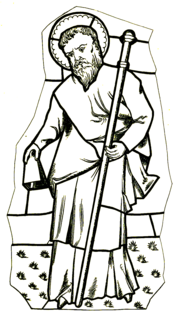
Saint Aelhaiarn or Aelhaearn was a Welsh confessor and saint of the British Church. He was a disciple of Saint Beuno. His feast day was usually observed on 2 November, although it is sometimes recorded as the 1st and is no longer observed by either the Anglican or Catholic church in Wales.

A Saint Ilar is listed among the 6th-century saints of Wales and is the probable namesake of Llanilar in Ceredigion and its former hundred of Ilar. His feast day is variously given as 13, 14, or 15 January, but is no longer observed by either the Anglican or Catholic church in Wales.